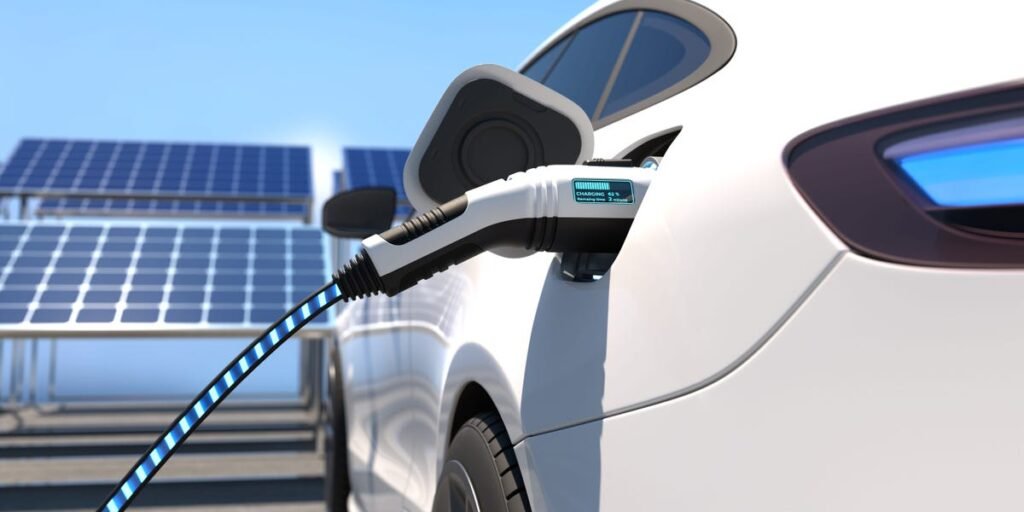- Lithium-ion batteries are the most common type of battery found in electric vehicles.
- Scientists have found that they contain PFAS, or “forever chemicals,” found in air, water, snow, soil and sediment.
- Research calls for better battery technology and recycling to mitigate PFAS contamination.
Scientists have discovered a new source of harmful “forever chemical” pollution: the rechargeable lithium-ion batteries found in most electric vehicles.
Some lithium-ion battery technologies use PFAS (per- and polyfluoroalkyl) chemicals to make the batteries more flame-retardant and conductive. Scientists found high concentrations of PFAS in air, water, snow, soil and sediment samples near plants that make these chemicals in the United States, Belgium and France, according to a peer-reviewed study published in the journal Nature. Nature Communications.
PFAS are known as “forever chemicals” because they accumulate quickly in the environment, people and animals and don’t break down for thousands of years. They have been linked to a variety of health problems, including liver damage and high cholesterol., Low birth weight, Chronic kidney disease.
The findings highlight that while a switch to cleaner vehicles and renewable energy is key to solving the climate crisis, it comes with a series of trade-offs that are still unclear and understudied. The environmental and health impacts of mining lithium and other minerals used in batteries, solar panels, wind turbines and other technologies are well documented, but only recently have researchers discovered lithium-ion batteries as a source of PFAS contamination.
“Slashing [carbon dioxide] “Reducing emissions from technological innovations like electric vehicles is important, but it should not come with the side effect of increasing PFAS pollution,” Jennifer Gelfo, an associate professor of environmental engineering at Texas Tech University and co-author of the study, said in a statement.
This is a global concern because lithium-ion batteries are used worldwide, according to the study. The same types of PFAS were recently found in low concentrations in water in Europe and China, but the source of contamination was unknown.
The particular class of PFAS that Guelfo’s team found is called bisperfluoroalkylsulfonimides, or bisFASIs. Scientists tested more than a dozen lithium-ion batteries used in consumer electronics such as EVs and laptops and found varying concentrations of bisFASIs.
Lee Ferguson, an associate professor of environmental engineering at Duke University and co-author of the study, said it’s difficult to know how prevalent these chemicals are in any given lithium-ion battery because not enough research has been done yet.
Guelfo said bisFASIs are comparable to “older and more notorious” chemicals like PFOA, in part because they are very difficult to break down and studies have shown that even low concentrations can change the behavior of aquatic organisms, and PFOA continues to contaminate drinking water even though it is being phased out in the United States.
This study is the first to assess the environmental impact of using bis-FASIs in lithium-ion batteries from cradle to grave. The effects of bis-FASIs on humans have not yet been studied.
The scientists found bis-FASI chemicals at parts per billion levels, much higher than the limits the Environmental Protection Agency set for PFAS in drinking water in April. Strategies to remove PFAS in drinking water can also remove bis-FASI, the study says, and EPA regulations should allow the strategy to be more widely adopted. But chemical manufacturers and some water utilities are suing the EPA in court.
There are other routes of exposure to BisFASI: Air emission data shows the chemical can travel far from manufacturing sites, and it can also leach into the environment from landfills, where the majority of lithium-ion batteries are disposed of.
According to the study, the recycling rate for lithium-ion batteries is only about 5%, and by 2040, lithium-ion battery waste could reach approximately 8 million tonnes.
Guelfo said scientists, engineers, manufacturers and policymakers need to develop battery technologies and recycling solutions that don’t exacerbate PFAS contamination.
“We need to carefully evaluate these chemicals that are being used in sustainable energy infrastructure,” Guelfo said, “and do it now before the problem becomes even more widespread. We have an opportunity to really make the most of sustainability.”
Companies including 3M, Solvay and Arkema either hold patents on BisFASI or advertise their manufacture or use, the study said. (In December, after the study was conducted, Solvay spun off its specialty and applied chemicals business to form a new company called Syensqo, where its lithium battery business is housed.)
The scientists focused their research in areas near the companies’ manufacturing plants in Minnesota, Kentucky, Antwerp, Belgium, and Salindolph, France.
3M has been making PFAS for decades and last year agreed to a $10 billion settlement with U.S. cities and towns that alleged the company contaminated drinking water with permanent chemicals. 3M said it would stop making all PFAS by the end of 2025.
The company’s settlement follows a separate agreement by Chemours, DuPont and Corteva to pay $1.19 billion to help settle thousands of lawsuits.
Correction: July 8, 2024 — This article has been updated to clarify the name of the company that makes EV battery materials. After the research, Solvay spun off its lithium battery business into a new company called Syensqo.

